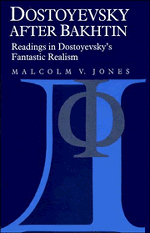Book contents
2 - The Double: Dostoyevsky's idea for The Double
Published online by Cambridge University Press: 21 August 2009
Summary
No analysis of Dostoyevsky's fantastic realism can afford to overlook his second novel. When it was published in Notes of the Fatherland in 1846, everybody, it seems, was disappointed in The Double; almost all reviewers disliked it, accusing Dostoyevsky of imitating Hoffmann or Gogol, even to the extent of plagiarism (K. S. Aksakov, for example, in The Petersburg Collection.)
Even the sympathetic Belinsky, who had enthused wildly over Dostoyevsky's first novel Poor Folk, was driven to make excuses for the way his protégé had misused his talent. Dostoyevsky himself was devastated and was soon persuaded that his second was an artistic failure. Yet he stood by the idea of The Double virtually all his life.
He repeatedly thought of rewriting it, first of all in 1846, then in 1847, again in 1859, and finally during the years 1861–5. He never did so, although the 1866 version (which is the one we read) has some welcome pruning and is a great improvement on the original. We also have some brief notes for a reworking. They fall into two groups of episodes, the first concerning the Double's attempts to help the hero in his wooing of Klara Olsufyevna, the second being an account of the Double's involvement with contemporary polemics (including the Petrashevtsy and the system of Fourier which had begun to engage Dostoyevsky's attention shortly after the original version of his story was written).
Information
- Type
- Chapter
- Information
- Dostoyevsky after BakhtinReadings in Dostoyevsky's Fantastic Realism, pp. 35 - 58Publisher: Cambridge University PressPrint publication year: 1990
